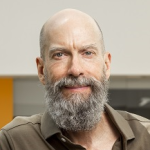Plenary Speakers
Friday, April 25
2:00 PM – 3:00 PM
Keynote: Adolescent Neurocognitive Plasticity and Specialization Shaping Adult Trajectories
During adolescence the foundation of adult neurocognitive trajectories is being established. Studies will be presented that characterize neurobiological mechanisms that provide evidence for unique developmental plasticity and specialization underlying this maturational period. We performed longitudinal studies using an accelerated cohort design spanning 10-30 years of age using high-field 7T MRI and EEG. We investigated the shape of cognitive development and reward processing and applied multimodal neuroimaging to measure concomitant developmental changes reflecting plasticity in neural activity (EEG), myelination (MRI R1), glutamate/GABA balance (MRSI) in prefrontal cortex, dopaminergic function (striatal tissue iron) in limbic systems and their connectivity informing a model of developmental specialization. Our finding provide evidence for adolescent specific plasticity of executive brain systems that may underlie risk for atypical trajectories that underlie the emergence of psychopathology but also identifies a window of unique malleability when trajectories can be affected.

Beatriz Luna, PhD
University of Pittsburgh
Beatriz Luna, PhD is the Distinguished Staunton Professor of Psychiatry and Pediatrics as well of Professor of Psychology, Radiology, and BioEngineering at the University of Pittsburgh. She is the founder and Director of the Laboratory for Neurocognitive Development, founder and acting past president of the Flux Society for Developmental Cognitive Neuroscience, Editor-in-Chief of the journal Developmental Cognitive Neuroscience, and Scientific Director of the Magnetic Resonance Research Center at the University of Pittsburgh.
Dr. Luna uses multimodal neuroimaging (s-, rs, t- fMRI, EEG, MEG, PET, MRSI, tissue iron, and 31P) to investigate the neurobiological mechanisms that support the transition from adolescence to adulthood when lifetime trajectories are determined to inform basic processes of normative development. Her studies have identified changes in brain function, connectivity, neural oscillations, myelination, and neurotransmitters. Notably, her recent findings provide evidence for unique critical period plasticity in prefrontal cortex through the adolescent period that further supports that adolescence is a time when adult neurocognitive trajectories will be established. Together her findings have led to the influential Driven Dual Systems Model of adolescent development, which indicates that the brain systems supporting executive processes are specializing but available in adolescence and are driven by neural processes supporting motivation and affect. Her model emphasizes that adolescence is a critical period of brain specialization in which adult modes of operation are determined – underlining vulnerabilities for the emergence of psychopathology.
Dr. Luna has published over a hundred and eighty peer-reviewed articles describing her innovative studies, in addition to theoretical papers discussing her models of adolescent development. She has received numerous awards including the Presidential Early Career Award in Science and Engineering, the Provost’s Award for Excellence in Doctoral Mentoring, Distinguished Professor of Psychiatry, and the Flux Huttenlocher Award for pioneering work in developmental cognitive neuroscience. Her research has been continuously supported by the National Institutes of Mental Health recently being awarded a MERIT award to sustain continued investigations. She has informed policy including US Supreme Court briefs regarding extended sentencing in the juvenile justice system. Her extensive media history includes a cover story in National Geographic and a PBS Special with Alan Alda – “Brains on Trial”.
Thursday, April 24
1:45 PM – 2:45 PM
Presidential Symposium: Cognition emerges from neural dynamics
Traditional views compared brain function to a network of neuron connections, like telegraph systems however, growing evidence suggests higher cognition involves emergent properties: rhythmic oscillations, or “brain waves.” Brain functionality goes beyond simple connections, resembling a system where “telegraph wires” also generate “radio waves” (electric fields) for rapid communication. This enables millions of neurons to self-organize, similar to a crowd doing ‘the wave’. These rhythms play a vital role in organizing our thoughts.

Earl K. Miller
The Picower Institute for Learning and Memory and Department of Brain and Cognitive Sciences<br /> Massachusetts Institute of Technology
Earl K. Miller is the Picower Professor of Neuroscience at the Massachusetts Institute of Technology. He has academic appointments at The Picower Institute for Learning and Memory, and The Department of Brain and Cognitive Sciences at MIT.
Professor Miller earned his B.A. (summa cum laude, with honors) from Kent State University in 1985, and his M.A. (1987) and Ph.D. (1990) from Princeton University. In 2020, he received an honorary Doctor of Science degree from Kent State University.
Professor Miller’s work has been pivotal in understanding the neural basis of cognition. He has made significant discoveries in areas such as working memory, attention, categorization, and top-down ‘executive’ control. He developed a key theory in cognitive neuroscience, emphasizing the role of the prefrontal cortex in rule learning and goal maintenance. Professor Miller pioneered the study of multifunctional ‘mixed selectivity’ neurons, marking a departure from traditional views. He has provided new insights into the role of neural dynamics in shaping perception, thought, and action. By combining experimental, theoretical, and computational methods, his work offers vital insights for understanding cognition and its disorders in conditions such as autism, schizophrenia, and attention deficit disorder.
Professor Miller has received numerous awards and serves in editorial roles for major neuroscience journals. He also serves on international advisory boards. His 2001 paper with Jonathan Cohen, introducing a novel theory for understanding executive brain functions, is the fifth most-cited paper in the history of neuroscience.
